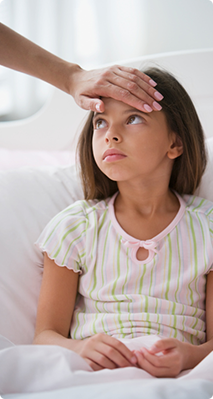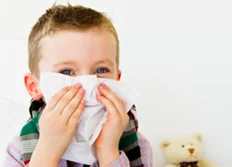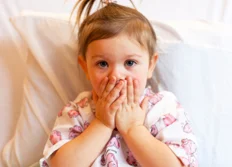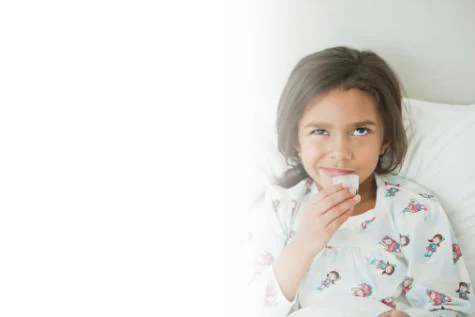It’s not unusual for children to get a mild fever. So it’s good to feel sure about what’s normal and be confident you can tell when your little one is definitely unwell.
From taking their temperature to doing all you can to bring down their fever, there’s lots of ways you can help your child feel better.
What is a normal temperature?
When it comes to a ‘normal’ temperature, every young child is slightly different.
Your little one’s temperature range can vary quite widely, and go up and down quickly as their body hasn’t yet worked out how to control how hot they get.
Generally, if they have a temperature above 37.5°C, then it’s classed as a fever.
How do I know if my child has a high temperature?
Your little one may look flushed or hot, but to be sure that they have a temperature, you’ll need to use a thermometer.
To get a fast and accurate reading it’s best to use a digital thermometer.
How to take your child’s temperature
If your child is under 5, you should take their temperature under their armpit not under their tongue, as you’ll get a more accurate result.
Pop the digital thermometer under their armpit and hold their arm against their body for as long as the thermometer’s instructions tell you (keep watch or they may try and play with it!)
Try to keep a note of the reading as this will help you track how your little one is doing. Remember, any temperature above 37.5°C is usually classed as a fever.
Download our fever diary to keep track of their temperature (PDF)
How can I help them feel better?
As a parent it can be very worrying if your child has a high temperature. But it is very common and often clears up by itself. While it lasts, here are some ways to help your little one feel more comfortable:
If your child is distressed, you can use a paracetamol-based medicine to reduce a fever.
CALPOL® Infant Suspension, which contains paracetamol, gets to work on fever in just 15 minutes. It’s suitable for most babies from 2 months.
Handy tip
Undressing your child to their nappy or underwear and covering them in a light cotton sheet can help them feel more cool and comfortable.
Some more simple tips
Make sure your child gets plenty of restful sleep.
Try not to overheat your house. Your child should be more comfortable in a well-ventilated room at a normal temperature.
Your child might lose their appetite – this should only last a couple of days. Just let them eat when they are hungry.
Make sure they have plenty to drink. If they have started eating solid food, offer lots of cool drinks, especially water.
How long will it last?
When your little one is suffering from a fever, it can be a sign that their body is fighting an illness, like an ear infection, the flu, or chickenpox.
So it can last for anything from a few hours to a few days, depending on what they’re fighting off and how poorly they are.
When to call the doctor
Although it can be hard to see your little one feeling so hot and bothered, most fevers will soon clear up.
But you should get in touch with your GP if:
your baby is less than 3 months, and has a temperature 38°C or over
your child is 3 to 6 months, and has a temperature 39°C or over
as well as a fever, your child has other signs of being unwell, such as floppiness, drowsiness, persistent vomiting or refusal to feed.
The information on this page is not exhaustive. You know your child best, if you have any concerns about your child, you should contact your GP.
See also
Post-immunisation fever
Your baby may develop a slight fever after an immunisation. It’s normally nothing to worry about, but it can be unpleasant. Discover how you can help
Contact the HSE
For health advice and reassurance.
1850 24 1850






